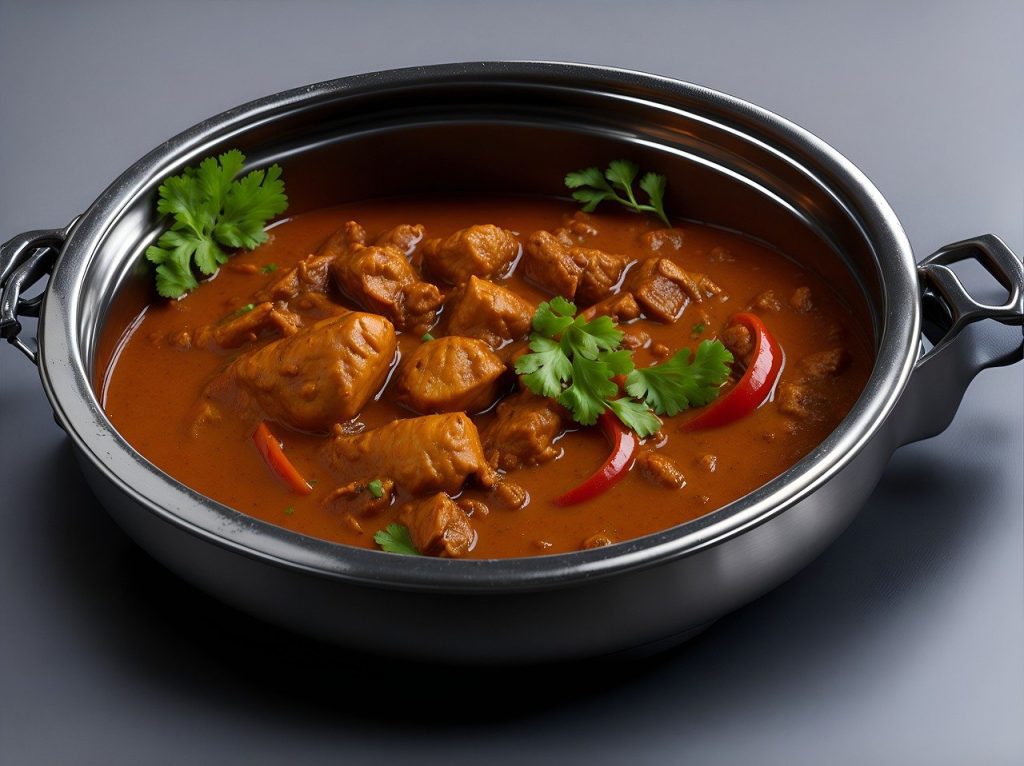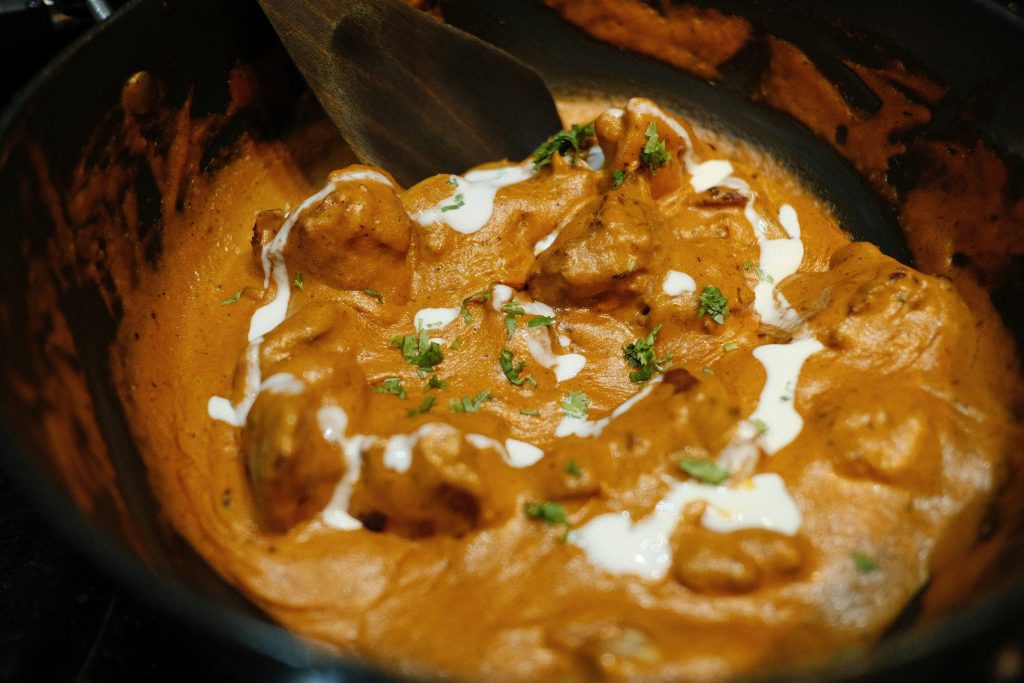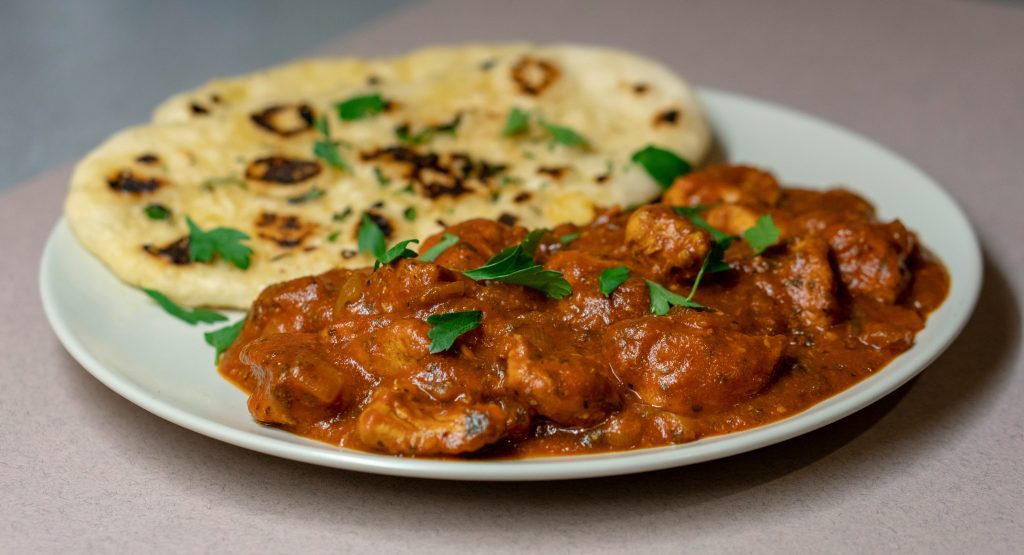Learn about Nutritional Benefits of Chicken Curry. Discover if chicken curry can be a healthy meal choice and how to make it nutritious with these simple tips. Explain the Cons of Chicken Curry.
Introduction
Chicken curry is a spicy and aromatic dish prepared ready to eat that is made up of chicken stewed in a spice sauce with numerous spices such as cumin, coriander, turmeric, and chili; therefore, it is quite famous among people. Chicken curry was first from the first food in India with some variations in different places in the selection of ingredients and their preparation.
The variety of sauces may include versions that are thick and contain tomatoes, whereas others may be creamy and rich due to the presence of yogurt or coconut milk. In most cases, chicken is cooked gently in the sauce until it becomes soft enough to absorb all those intricate flavors.
The meal is often paired with rice, naan, or roti, thus making it a flexible and complete meal. This has contributed to its various forms and modifications around the world reflecting on the tastes and food preparation techniques of each region.

Is Chicken Curry Healthy?
Chicken curry can be a healthy meal option when prepared with nutritious ingredients and mindful cooking techniques. Chicken, a lean protein, supports muscle health and satiety. Antioxidant and anti-inflammatory properties are possessed by the spices including garlic, ginger, and turmeric which contribute to wellness.
However, the healthiness depends on how it is prepared. Oil, cream, or coconut milk can very much bump up calorie and fat content. It is healthier with leaner cuts of chicken, reduced oil use, and a search for low-fat or dairy-free alternatives for the creamy parts.
This is high in fiber, vitamins, and minerals, for many vegetables are added. Chicken curry would be a good, healthy balanced meal if proper controls are used in the management of portions and the ingredients themselves.
Nutritional Benefits of Chicken Curry
- Protein Content: Chicken is a delightful food rich in proteins. The latter is necessary for the growth of muscles, repair of muscles, and other functions within the body. It is well known that a standard serving of chicken curry contains much protein content that will keep us full and continue to maintain our muscles.
- Vitamins and Minerals: The usual vegetables used in the preparation of chicken curry are onions, tomatoes, or bell peppers. These give us Vitamins C and A and vital minerals like potassium or magnesium, which not only work to keep an immune system healthy but also to maintain good eyesight.
- Spices and Antioxidants: Turmeric, ginger, and garlic are mostly used in chicken curry and they have both anti-inflammatory and antioxidants. The most important benefit of turmeric is its curcumin which has been associated with numerous health benefits, such as better memory and less chance of getting chronic diseases.
Balancing Chicken Curry in an Overall Healthy Diet
- Portion Size: Keep the portions small of chicken curry just like your palm size. Over-eating will result in surplus calories regardless of the healthy dishes. Play a balancing role by fitting curry with small portions of rice or whole grains to control your intake of carbohydrates.
- Ingredient Quality: Use lean chicken cuts such as skinless breasts to minimize fats. Where possible use fresh, organic ingredients. Superior spices and vegetables will enhance flavor and introduce necessary nutrients into your curry without requiring additives that are processed or unhealthy.
- Healthy Cooking Methods: Fry less, and grill, bake, or sauté the chicken instead. Reduce the amount of used oil by using healthier ones, such as olive or coconut oil. Use yogurt or coconut milk to cook the curry instead of creamy sauces. This way, you’ll reduce unhealthy fats without compromising flavor.
- Balance with Vegetables: Add liberal amounts of vegetables to improve the nutritional value of chicken curry. Fiber vitamins and minerals will be added to your diet making the meals lighter and more balanced thus increasing volume while not significantly increasing calories.
- Spices as Nutrients: Turmeric, cumin, and coriander spices not only flavor your chicken curry but also act as anti-inflammatory and antioxidant agents. Having a wide variety of spices on your chicken curry will be a great way to boost the immunity and overall health in your body by having fewer unhealthy flavor enhancers like sugar or excess salt.
- Avoid Excess Salt and Sugar: Salt added should be limited and the sugar added to curries must be avoided. Instead, use their natural flavors from spices and herbs. Added salt causes excessive intake of it and develops hypertension. On the other hand, added sugar provides empty calories. Taste your curry while it cooks and adjust its flavor with your natural seasonings.
- Leftover Strategy: Store it in the smallest quantity possible in tightly closed containers to enjoy quick meals during the week. Leftovers save time and give fewer invitations to ordering takeout. Always be sure to reheat the leftovers very well and consume them within 3-4 days to maintain freshness and safety.
Cons of Chicken Curry
1. High Calorie Content
Chicken curry can be high in calories, especially when made with cream, coconut milk, or lots of oil depending on the recipe. If consumed too much this may lead to too many calories and result in weight gain.
2. High Saturated Fat
In the long term, the addition of saturated fat which may be cholesterol-raising or contribute to heart problems can be achieved by using fatty chicken parts in skin or creams.
3. Excess Sodium
Much salt or market-bought spice blends are used in most chicken curry recipes making these recipes contain high sodium levels. This could cause hypertension and other cardiovascular problems due to excessive intake of sodium.
4. Potential for Foodborne Illness
Chicken curry can lead to a rise in bacteria such as salmonella if it is not stored properly or cooked at all. Badly done reheating and careless handling of food are some of the reasons why food poisoning and other related gastrointestinal problems occur.
5. Overuse of Spices
Spices do have health benefits but, too much of them could harm you, especially if you are the kind of person who is sensitive to heat. For instance, eating too much spice may lead to stomach upset in some individuals by the body rejecting it through acid reflux or heartburn.
6. Imbalance of Macronutrients
If not enough veggies are added or if you use very fatty sauces and meats, chicken curry may turn out to be unbalanced at times. Thus, the outcome might be a meal that is rich in proteins and fats but low in fibers or any other necessary substances.

Factors Affecting Healthiness
- Caloric Content: The calorie count for chicken curry has a vast range based on the cooking method used to arrive at such a dish. Curries rich in heavy cream or coconut milk are normally known to be more numerous in calories and saturated fats than others served with low-fat non-dairy ingredients which reduce their caloric content significantly.
- Sodium Levels: Store-bought or restaurant chicken curry may contain a great deal of sodium, especially if salt is added along with other flavorings. Such high sodium intake can lead to elevated blood pressure levels and many cardiovascular conditions. Preparing your chicken curry gives you a better means of controlling the level of salt added.
- Fat Content: In many conventional chicken curry recipes, a large amount of oil or ghee is added, which is responsible for the dishes turning out to be more fatty. To make healthier chicken curries, it is recommended to reduce the usage of oils or to opt for health-friendly fats like olive oil and visible fats from the poultry are to be removed.
Tips for a Healthier Chicken Curry
- Choose Lean Cuts: Skinless chicken breast or thigh cuts can help reduce the amount of fat that is being consumed. Lean cuts have lower fat and calorie content than chicken with skin or dark meat parts.
- Increase Vegetable Content: Some other vegetables like spinach, carrots, or peas will complement it in terms of nutritional value. It will also make the food very delicious while, on the other hand, enhancing fiber content and thus having direct benefits on digestion as well as overall health.
- Use Low-Fat Dairy or Alternatives: The inclusion of cream or yogurt is better when using their low-fat versions or plant-based alternatives. Instead, coconut milk should be consumed only on a rare basis, but lighter variants should be chosen whenever feasible.
- Control Portion Sizes: If consumed excessively, even nutritious meals may lead to obesity. Therefore, keep portions reasonable and include whole grains or vegetables with your dish.
FAQs
Can chicken curry be high in calories?
Certainly, consuming chicken curry might prove an advisable choice, especially if too much cream, coconut milk, or fats are added during its preparation. Reducing portions and including less calorie-dense components as substitutes can also help regulate the number of calories present within a dish.
Is chicken curry safe for people with heart conditions?
Chicken curry can be heart-healthy if prepared with low-fat ingredients and low sodium. Avoid heavy creams use less oil content and add heart-healthy spices like garlic and turmeric.
Is chicken curry suitable for a balanced diet?
If chicken curry is made with all the right kinds of wholesome ingredients and in appropriate amounts, it may be eaten as balanced food. Make it a full meal by adding whole grains and vegetables.
Is chicken curry suitable for children?
Chicken curry can be a very nice source for kids, too, if it is prepared relatively mild and with lean chicken. Also, ensure that it is not too spicy made with low-sodium ingredients, and served with whole grains and vegetables for a healthy meal.
Can chicken curry cause digestive issues?
Chicken curry will also give you digestion problems if it is created with heavy cream, too much spice, or high in fat. To avoid this, you would then use just the right amount of spice, lean meat, and lower-fat ingredients to help ease digestion.
Conclusion
Chicken curry is another healthy dish if cooked with a careful selection of ingredients and also within the proper balance, as well. By slicing it with trendy protein-rich meals, this sapid dish can be enjoyed even if it means reducing some of the fatty or salty things. The home-made offers an additional influence of controllable components whose nourishment levels may be freely obtained thereby allowing for personalized planning according to one’s health aspirations.
